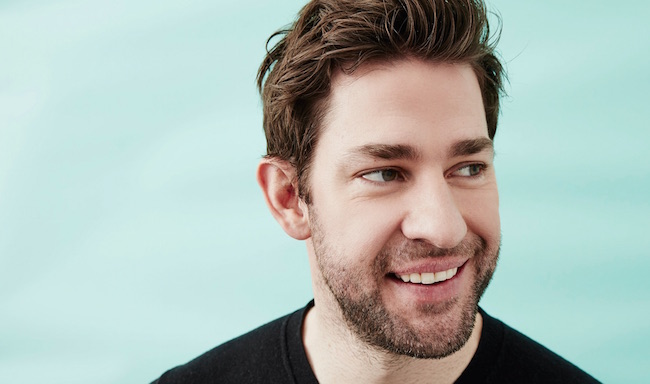
If your favorite team loses in soul-crushing style – as John Krasinski’s New England Patriots did this past Sunday – it’s probably nice to be involved with two films at the Sundance Film Festival to, perhaps, take one’s mind off of that game.
I met Krasinski at the upstairs section of a bar that had been rented out for the purpose of conducting interviews. By this point in the festival, things aren’t quite as tidy as they once were, so Krasinski and I were sitting at a table filled with discarded coffee cups. In person, Krasinski is polite and quick-witted. He has a talent for making a stranger feel like an old acquaintance, even though I had never met him before. (I briefly went along with this because he has a way of making it just feel right, before remembering that we had never met.)
Krasinski is at Sundance in support of his second directorial feature, The Hollars – which, as Krasinski openly admits, follows the indie film trope of “big city person (played by Krasinski) has to travel back to small town home because of a family emergency.” But so what, as long as it’s good. And Krasinski thinks he’s got a pretty good movie here with an exceptional cast that includes Richard Jenkins and Margo Martindale as his parents, Sharlto Copley as his brother, Anna Kendrick as the future mother of his child, and Charlie Day as his old high school enemy.
Krasinski is also the producer of Kenneth Lonergan’s Manchester by the Sea, which has been swept up in so many Sundance accolades that the word “Oscar” has already been thrown around. Anyway, that should be enough to get anyone’s mind off of the Patriots’ loss. (Though, to be honest, Krasinski did still seem a little upset about the whole thing.)
John Krasinski: Hey, good to see you again.
Hey, yes. Wait, I’ve never met you before.
You haven’t? What?
I talked to you on the phone once. In 2009, for Away We Go. I’m sure you remember that fondly.
[Laughs.] Yes, I remember that phone call.
Yeah, that was a great phone call.
Now everything’s going downhill.
I’ll write in the introduction to this interview, “We got off to a rocky start.”
Is this your coffee cup?
No. Is it yours?
People are just leaving trash on our table.
No good is coming out of this interview.
Yeah, right.
I like The Hollars.
Thank you. That’s it, perfect. Stop there.
Though, when I was looking through the Sundance guide and I read the description, I’m like, “Oh, this sounds familiar.” We’ve seen this before.
One hundred percent.
And I’m watching it and I’m like, “Who gives a shit? I’m laughing.” Does that make sense?
Not only does it make sense, it’s exactly the truth. And I’ll go farther than that and I’ll say that’s exactly what I thought when I got the one-liner sent to me about the script. I was like, “Oh, I’ve seen this before” … and then once I decided to direct and when you read that script, you’re like, “In its best version, this could be great. In its worst version, it could be bad.”
And if you don’t get the right cast, it probably doesn’t work.
I know Jim Strouse wrote it with Margo Martindale in mind… I remember Richard Jenkins, as he read the script – he liked the script – but he said, “Yeah, if you can get Margo Martindale, great. If not, good luck.” So, I got Margo, which means I got Richard. And then when that happened, I think Anna Kendrick signed on in like 30 seconds.
Richard Jenkins, throwing some weight around.
Yeah, exactly.
He’s an Oscar nominee. He can do that.
Totally. And he’s also a good enough actor that he’s like, “I have a lot of offers to do a lot of different things.”
He looked like he was having fun.
And I was nervous to meet him – because I think I had bumped into him one other time, but to work with him, he’s a serious dude. He takes it very seriously and that’s why he’s so good at what he does – because he’s not bullshitting anybody, you know what I mean?
He’s a big reason Cabin in the Woods works.
He loves that. He loves that movie. He said, “I’ve been in a lot of small movies like this, so it’s either going to be a good experience or a bad one, and I hope you lead me through a good one.” And at the end, he said it was one of the best experiences he had. That means the world to me, you know? One of the other films was by my good friend Drew Goddard, who did Cabin in the Woods.
And wrote The Martian script.
Exactly, yeah. Yeah. Drew is so incredible that it frustrates me because it just makes all of us look bad. That’s how nice he is, and talented.
I was happy when he got that Oscar nomination for The Martian.
He deserved it, yeah. I told him, I said, “I don’t know if you saw it on camera, but when I announced your name, there was like a little more excitement.”
Oh, that’s right, you announced the Oscar nominees.
I said, “I tried to have more panache with your name. I hope you saw it.” And he goes, “I did, I did!”
You produced Manchester by the Sea, which is getting insanely good reviews. I’ve seen the word “Oscar” mentioned already.
Yeah, yeah, yeah.
That’s got to feel nice.
It’s amazing.
For you, does this help offset a little bit what happened with the Patriots game Sunday?
[Laughs.] Yes, it does. It does.
That was a great game.
That was a tough one. That was a really tough one. You know what the good thing is? At least it was a really good football game.
I hate the Patriots like everyone who’s not a Patriots fan.
Got it. Yep, you hate winning.
But the Patriots and Panthers would’ve been a great Super Bowl.
Would have been, yeah. I agree. The Panthers looked so good. Oh my God.
Brady almost did it again, though.
And the Broncos’ defense was amazing. So, there’s nothing you can do.
But you’ve got these movies at Sundance.
Exactly, yeah. That’s exactly right. Focus on the good stuff.
Is directing your main focus now? Is this what you want to do?
No…
Is this going to be actor, then director, then actor? Like how someone like Clooney does it?
Yeah, that’s a great example. He does great movies. My thing is I always want to be directing a movie only if I can see why I’m the guy to do it, you know what I mean?
You were with Manchester by the Sea from the beginning. Were you ever going to direct it?
No, I was going to be in it, because it was my story. So, I came up with the idea for that story, so that was going to be my first original screenplay that we were going to work on. No, to me, directing is such a highly respected thing. I never was one of those actors who thought directing was a foregone conclusion. I was never like, “Oh, I’ll act and then I’ll direct.” I respect that job so much that I admit fully that I’m learning. I’m learning as you go along. I would never claim to be like, “I’m a master filmmaker.” It’s like, no, I’m constantly learning.
Is it harder because you’re already a famous person?
Maybe.
If it was directed by, I don’t know, “Gabe Berman” or something instead? It was similar when Jon Stewart directed Rosewater. I just wonder if there’s more scrutiny because you are already known.
Poor Gabe Berman.
But it can be, “Oh, look at this guy…”
But it’s par for the course. I mean, you’re never going to avoid that. It is sad, it’s upsetting, but it’s par for the course. But I think the goal for any movie is that it’s just seen and taken for whatever it is you want to take it for. You know what I mean? For people to judge a movie, whether it’s Jon Stewart’s movie or 13 Hours and trying to say what the movie is before they go see it, that’s a bummer. Like, go see it and judge it however you want, but go see it and talk about it.
Speaking of, because there was all this controversy with 13 Hours before people saw it, then people saw it and most people liked it.
Yeah.
Were you surprised that a lot of critics seemed to like it?
Yeah, critics I think were probably harder on it, and some people said there were pieces about it being a propaganda movie, which I think is crazy. The cool thing is, it’s a human story that what I loved is as soon as we saw, the cinema score was in the 90s…
It’s at like 60% on Rotten Tomatoes, and if you look at Michael Bay’s history, that’s pretty up there.
Yeah, yeah. [Laughs.] That’s pretty awesome. But you know, the funny thing is – and not to sound petty – you do have to keep connecting to the fact that you’re making movies for the people who see them, you’re not making them for the people who judge them.
But was there a sigh of relief that people actually responded pretty well to it?
Not a sigh of relief, it was more of an outcry of happiness. Because the truth is, we all got involved in this movie to tell the story of those heroes. Because, obviously, the idea of Benghazi has been highly politicized, but the politics has overshadowed this story.
It was a controversial movie before people saw it.
And by the way, there’s no better compliment than a movie being a conversation starter. So, go see it and start a conversation, but certainly don’t think you know what the movie is.
A lot of people don’t really know much about the actual event.
Not only what happened, but most people don’t even know that there was an actual attack that guys defended. Like, six heroes were involved in that. I know some people I talk to are like, “Oh, yeah, a bomb went off, right?” And it was like, no. You know, we went down and had the premiere in Dallas.
At the stadium.
Yeah. And I was like, “Wow, it’s a pretty crazy place to have a premiere.” And then you realize, it’s actually the greatest place to have a premiere, because those are the people who you’re actually wanting to represent. So, the greatest compliment I could ever get is people saying thank you. People saying, “Thank you. I lost my husband in Iraq, and this represents him, too. Thank you.” Or a guy going to shake your hand who, as you turn, you realize that he’s missing an arm, “I lost it in Afghanistan. Thank you for telling this story about heroes.” It’s like, that’s the most important thing. And then if you want to talk about the politics, go ahead, that’s your right, and it’s a part of the process. But you’ve got to acknowledge what happened.
There’s a line in 13 Hours in which you’re called Captain America. Is this an inside joke because you were up for Captain America in the Marvel movies?
[Laughs.] No. Okay, you know what’s funny? I never thought about it when we were shooting. But when I watched the movie, I was like, “Oh my God!” I never even put that together, but that’s hilarious.
When I saw the screening, a few us were wondering.
Yeah, “Take that, Chris Evans.” Yeah.
Alright. I’m out of time.
That was fun. Now, next time I see you, I’ll be like, “We’ve never met,” and you’ll be like, “No! He got it wrong again!”
And I’ll say, “Hey, how do you not remember, I thought you said it was fun? Remember the discarded coffee cup?”
“Oh, yeah, the coffee cup. Yes.”
Mike Ryan lives in New York City and has written for The Huffington Post, Wired, Vanity Fair and New York magazine. He is senior entertainment writer at Uproxx. You can contact him directly on Twitter.






